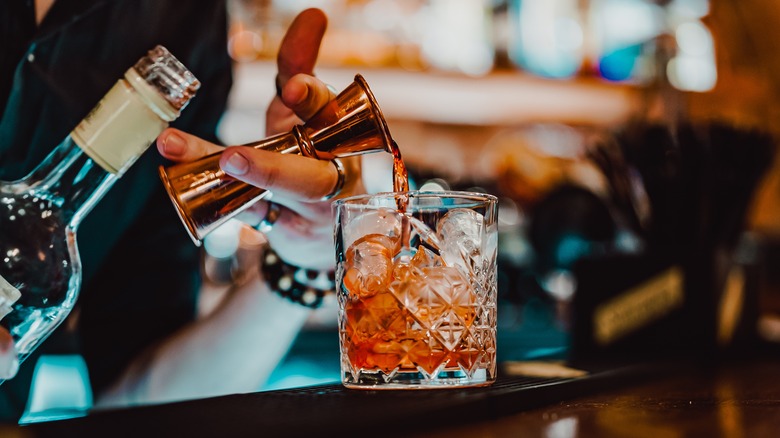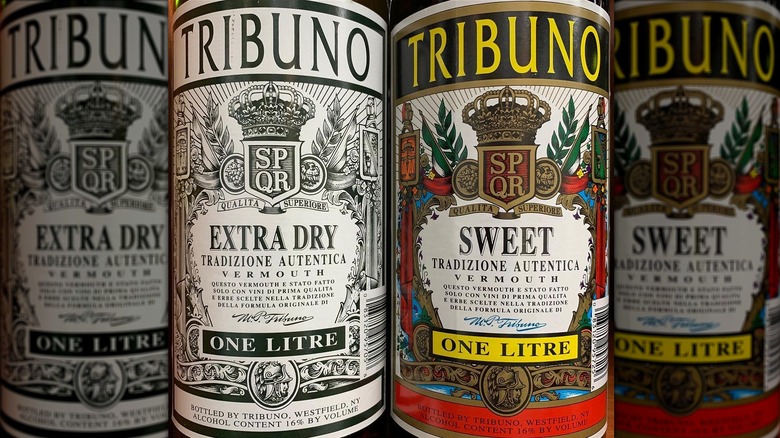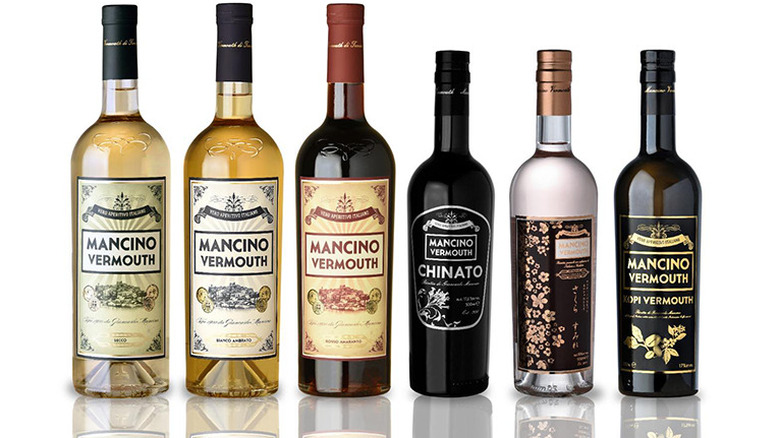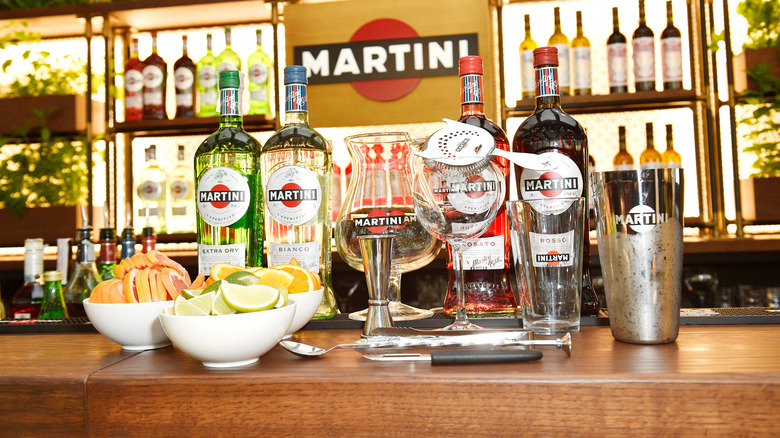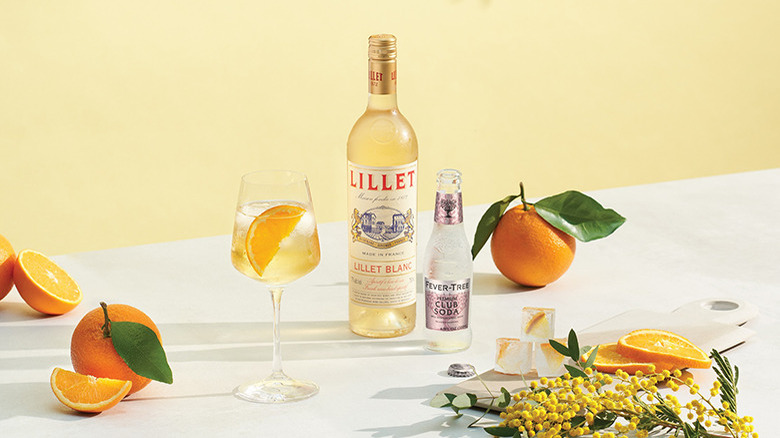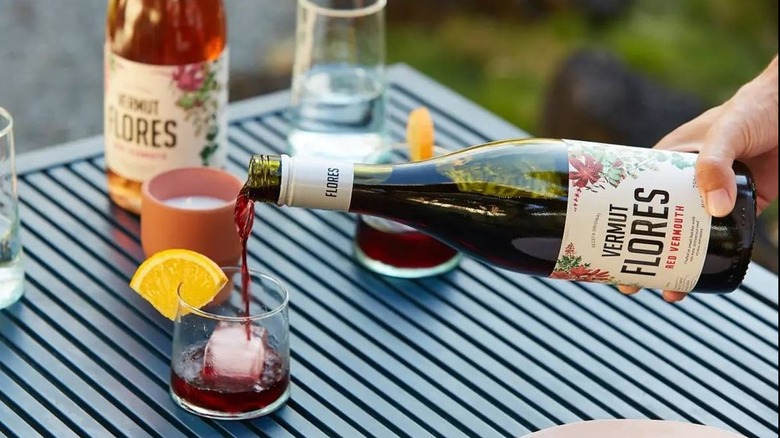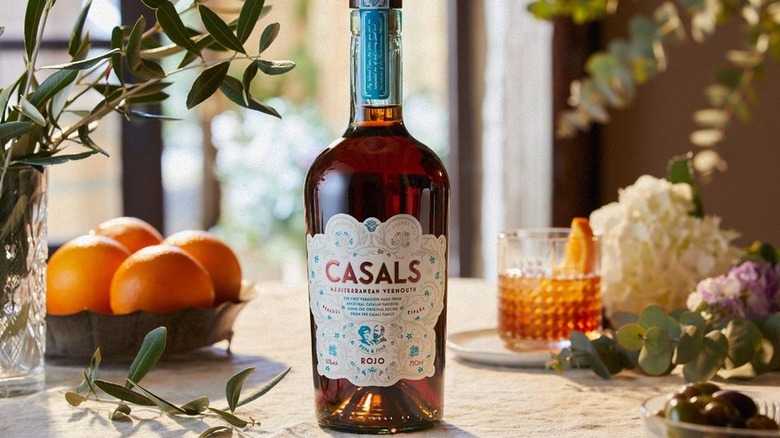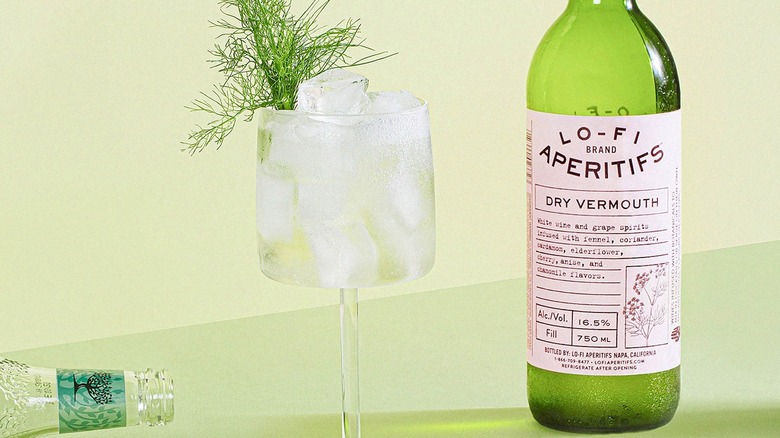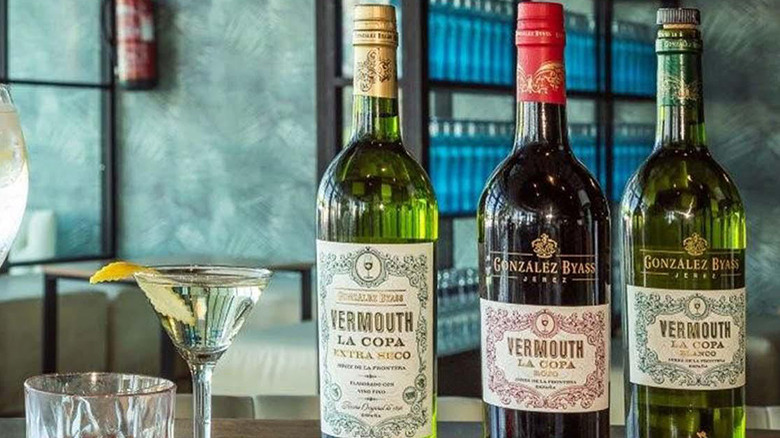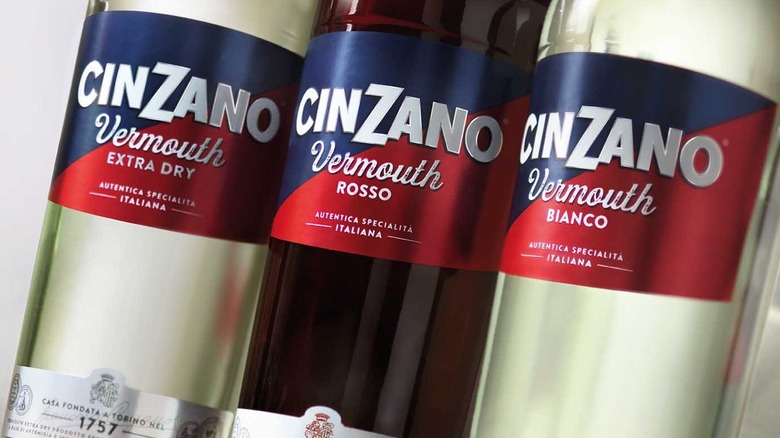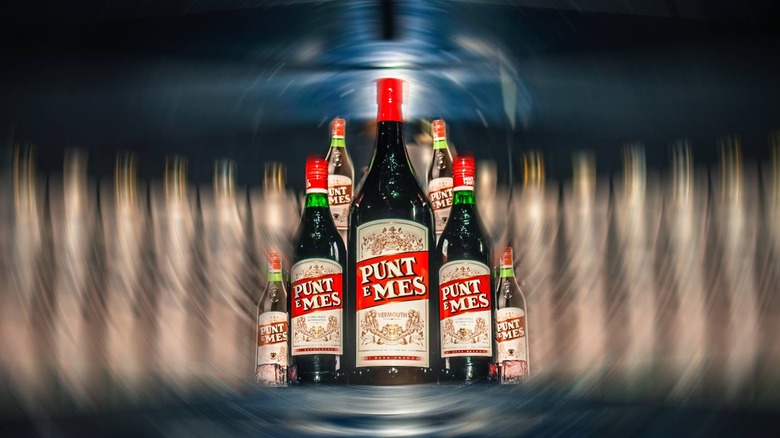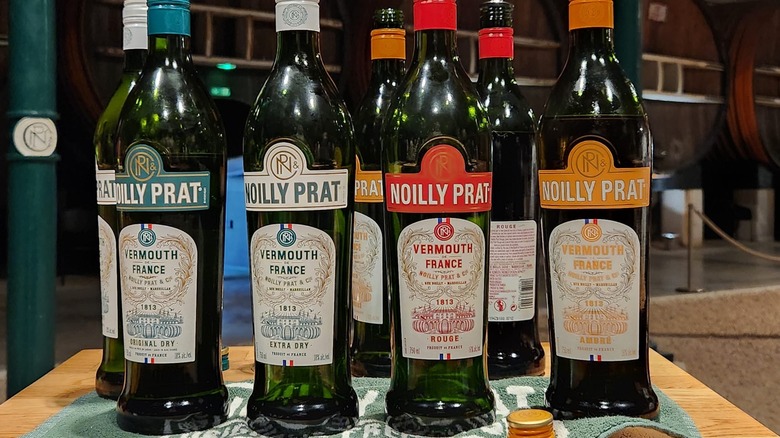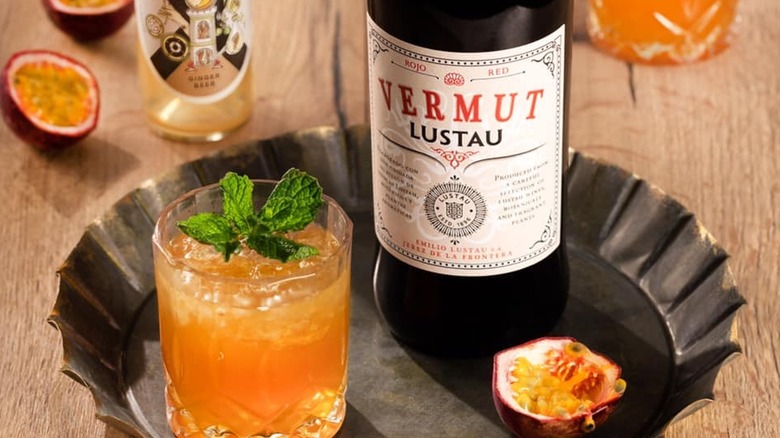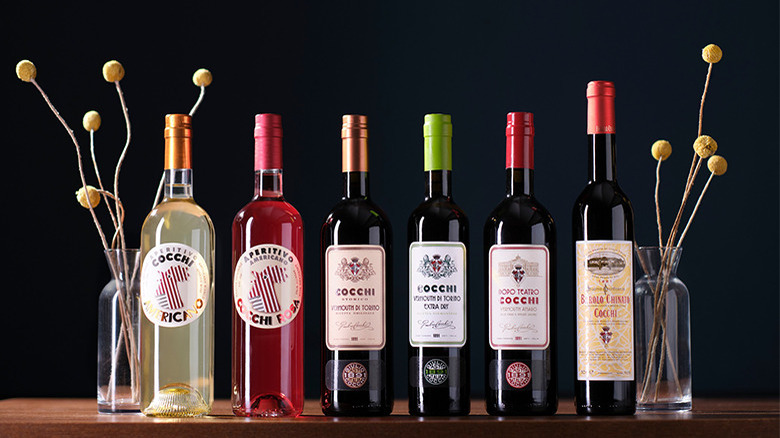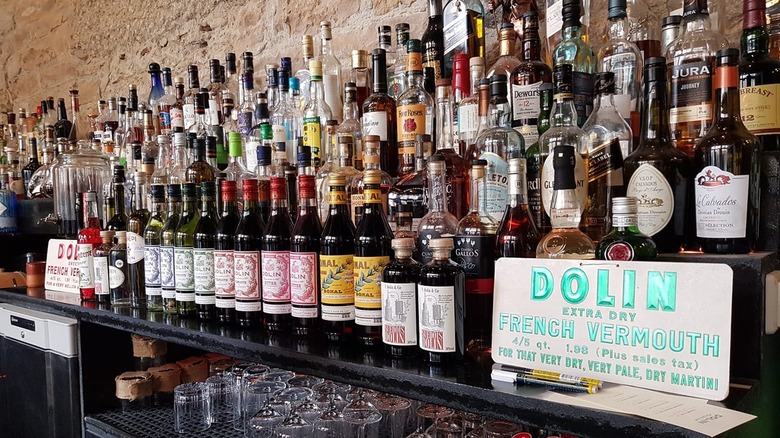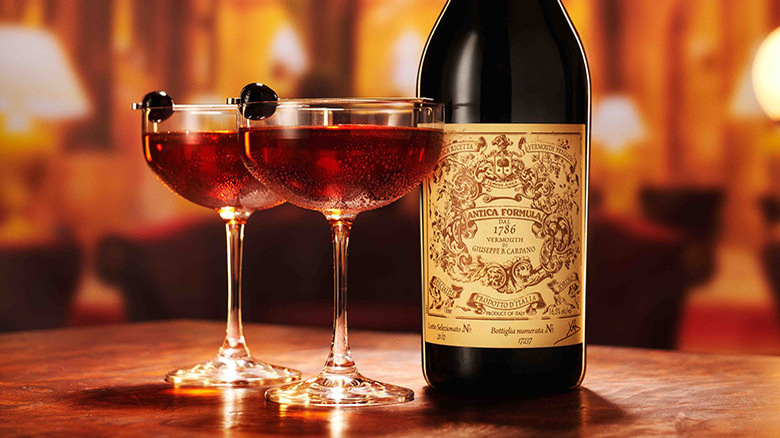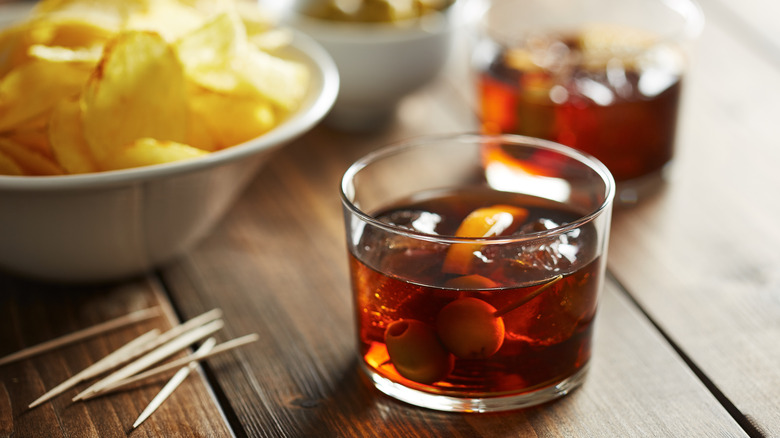15 Popular Vermouth Brands, Ranked
Quality vermouth is a must-have for your home bar. The fortified wine is used to make classic cocktails like the Martini, Negroni, Manhattan, and countless others. Many people may assume that all vermouth is the same and there's no point in buying a bottle of it for a higher price, but this is very far from the truth. Just like any other spirit, the quality of vermouth can vary drastically from brand to brand and a low-quality vermouth will make a low-quality cocktail. Furthermore, just because a bottle of vermouth is expensive does not necessarily mean that it is high quality.
Vermouth is classified as any fortified wine infused with any variety of botanicals, but there are also different types of vermouth altogether. Vermouth can be dry, sweet, white, or come in its own specific style. The two most common types of vermouth are dry and sweet. Dry vermouth, which is the vermouth used in a traditional martini, is sharper and cooler with a strong pronunciation of herbs. Sweet — or red — vermouth is found in Negronis and Manhattans and is very fruit and spice-forward with more warmth and depth.
This basic and inexplicit categorizing of the spirit makes for a wide-open door for vermouth-making. While the different styles carry general similarities, the specifics within each brand and bottle make for entirely different vermouth and cocktails they contribute to. If you find yourself vermouth shopping, here is a guide to help you along the way.
15. Tribuno
The first vermouth brand on the list is also one of the only products produced outside of Europe, and one of two made in the United States — California in particular. The Tribuno brand makes both sweet vermouth and dry vermouth, and they are commonly found on back bars, but there is a specific reason why: it's cheap.
Tribuno has been granted a spot in this list purely because of its economic convenience. A full-sized bottle of Tribuno Sweet Vermouth costs an average of $6. Tribuno is not at all a bad-tasting vermouth. It will make a fine Negroni, Manhattan, or whatever cocktail you need vermouth for. However, it does fail to compete with other more attentively crafted vermouths that utilize high-quality ingredients and century-old techniques. What makes vermouths made in France, Italy, or elsewhere in that region of Europe so great is the abundance of unique resources and a passion for preserving distilling methods passed down through generations. Frankly, Tribuno just can't compete by default.
The price point of this vermouth is entirely fair and reflective of its quality, which is just okay. The bottles Tribuno comes in, on the other hand, are reminiscent of a classic bottle of Italian vermouth, but, as is the case with any wine or spirit, do not judge a bottle by its label.
14. Mancino Vermouth
Mancino Vermouth is one of the youngest vermouth brands on this list, founded a little over a decade ago in 2011. The brand's vermouth is made at a very well-established distillery, however, which has been making wine for over 60 years in the Piedmont region of Italy. With so many vermouths that have been around for over a century, it's strange for one to pop up in the modern day, but that's exactly what world-renowned bartender Giancarlo Mancini set out to do.
After visiting the winery in the city of Asti, he became inspired to develop his own vermouth. Today, his brand produces and distributes seven bottles. The brand's flagship bottles include Secco, dry vermouth, Bianco Ambrato, a white amber, and Rosso Amaranto, a sweet vermouth. The other bottles are separate expressions of those bottles. For example, Mancino's Vecchio is an aged expression of the Rosso Amaranto, maturing inside an Italian oak barrel for one whole year.
Mancino has done well to make a name for itself in this world of vermouth that is already dominated by iconic brands. The fact that it was founded and the vermouths, themselves, were crafted by an immensely acclaimed bartender just shows how great these work in cocktails or simply on their own. One downside, however, is the brand's price. A bottle of Mancino Secco costs close to $42 on average. Mancino makes very high-quality vermouths, but a bottle of vermouth at that price is difficult to justify.
13. Martini & Rossi
Martini & Rossi is one of the most iconic vermouth brands in the world and they have sustained that reputation for over a century and a half for good reason. The brand was founded in 1863 by Alessandro Martini and Luigi Rossi in Asti, Piedmont. The exact location of Martini & Rossi lies in the small village of Pessione, perfectly situated in the heart of the region's winemaking, among the bounty of Alpine botanicals, and the trade route between Turin and Genoa. Since its conception, only eight people have been entrusted with the vermouth-making technique, which is passed down from one Master Blender to the next.
Martini & Rossi's products include sweet vermouth, dry vermouth, white vermouth, and their very own "Fiero," a blend of dry white wines infused with sweet and bitter orange to make an absolutely lovely aperitif. The brand also offers special reserve bottles including its Ambrato, which is made from a blend of Moscato Bianco wines, and Rubino, an authentic Vermouth di Torino.
An additional appeal of Martini & Rossi is its widespread accessibility and more than manageable price. The average price of a bottle of its sweet vermouth is just $10 on average. This inexpensive price should not be misconceived as cheap vermouth, however. Martini & Rossi can be found at any liquor store because it is good. It may not make as complex vermouths as others in its class, but it remains a simple, versatile, and low-cost vermouth brand nonetheless.
12. Lillet
Lillet Blanc is a French aperitif made in the Bordeaux region and can be found in some very iconic cocktails as well as an excellent substitute for regular dry vermouth in a martini. Lillet was founded back in 1872 by Raymond and Paul Lillet and has been producing this vermouth the same way ever since.
Lillet's location within the Bordeaux region makes for instant access to some of the most expertly crafted wines on planet Earth. Various white wines are blended together and infused with a variety of fruits. The brand is a dedicated and proud member of its home and strives to make its aperitif using a majority of wines made there. Some of these wines are bold, and some are more subtle, but all of them come together to make this exceptional and classic vermouth. The fruits used consist mainly of sweet oranges imported from Spain, Morocco, and Turkey as well as bitter oranges from Haiti. The oranges and their peels are soaked cold in alcohol before being removed from the liquid and pressed several weeks later.
As mentioned earlier, Lillet Blanc is a great substitute vermouth in a traditional martini, but can also be found in the original recipe for a White Negroni. The bold citrus notes of the aperitif play very well with the botanicals of gin, the two making for a blissful duo. The best part is that a full bottle of Lillet Blanc costs an average of only $24.
11. Vermut Flores
While vermouth's origins may be European, countries around the globe are crafting expressive versions of the fortified wine. From the Canelones province of Uruguay in the southern part of the country near Montevideo, Vermouth Flores is a small-batch vermouth using Uruguay's signature grapes, Tannat and albariño infused with 27 different botanicals.
The brand is a part of Basta Spirits, a premium beverage manufacturer begun in 2018 by managing partners Álvaro Aniano, a bartender by trade, 4th generation winemaker Juan Andrés Marichal, and writer and television personality Salvador Banchero. The company aims to produce elevated spirits with an eye toward innovation while honoring traditions.
Using high-quality Tannat for the Rojo and Rosado selections and albariño for the Blanco, crafted and bottled at the historic Marichal Winery, gives the vermouth base an elegant and well-defined character. Botanicals like wormwood, cardamom, gentian, and coriander add earthy spiciness and bitterness. At the same time, elderflower, rose, chamomile and hops add floral sweetness and herbal notes to the savory drink. With an alcohol of 16% to 18% and a $22 price per 750-milliliter bottle, we suggest drinking it nicely chilled over ice to fully appreciate its expressive aromatics. Or, if entertaining a crowd, the easy-to-enjoy aperitif is also available in a 5-liter boxed wine option.
10. Casals Mediterranean Vermouth
Casals is the youngest vermouth in the ranking, introduced in 2023. However, its lineage has been years in the making. The product is a part of Juan Torres Casals Distillery's portfolio, an offshoot of Spain's historic Familia Torres Winery. The family has been making wine in Spain's Penedès region since 1870.
With a commitment to sustainability, over 40 years ago, the Torres family began an initiative to rediscover ancestral grape types. The research has produced over 50 varieties thought to be distinct to date. Six show the ability to deliver quality wine fruit, including Selma, an ancient Catalan grape and one of the white varieties in Casals
Aside from innovation, Casals's creation is a love story. The original recipe for the vermouth dates back to 1928, when the second generation of the family, Juan Torres Casals, created the drink as a gift for his love, Pepa. The family discovered the original recipe in an old family cookbook.
The production begins with a white wine blend that ages in oak barrels for three years. After the initial aging, an infusion of 20 Mediterranean ingredients occurs from botanicals growing locally within Penedès, including tangerine peel, olive leaf, cardamom, rosemary, and wormwood, free of colorings or sweeteners. The resulting drink is smooth and rich, revealing sweet, spicy, bitter, and savory flavors. With 16% alcohol-by-volume and a $20 price, the product and its pedigree are among the most intriguing vermouths we have tried, earning it a top 10 ranking.
9. Lo-Fi Aperitifs
Steven Grasse is a busy man. The advertising executive turned distillery owner is the creator of some of the most well-regarded alcohol brands in the world, including Hendrick's Gin, Sailor Jerry Rum, Art in the Age Spirits, and Lo-Fi Aperitifs, a vermouth and amaro brand from California. The aperitif brand is a collaboration with California's family-owned E. & J. Gallo Winery.
Lo-Fi began in 2015, focusing on authenticity with an artisanal touch. The brand brings a mix of all-natural botanicals, fresh herbs grown on the West Coast, and quality California wine. The overall approach of Lo-Fi is not to take itself too seriously. Sill, including each ingredient in the botanical blend on the bottle's label, is essential to the brand, ensuring every product has complete transparency.
Lo-Fi's sweet vermouth includes a mixture of vanilla, rhubarb, cacao, cherry bark, gentian root, and orange oil bitters with a white wine base, delivering a fruity, bitter spirit with a sweet, flavor, ideal for mixing into a classic Negroni cocktail. Lo-Fi Dry Vermouth is clean, fresh, spicy, and dry, with a distinct greenhouse and licorice note from the mix of fennel, coriander, cardamom, and chamomile flowers, adding just the right hint of herbal freshness to a dry martini with a twist. The authenticity of each of Lo-Fi's vermouths, both having 16.5% alcohol-by-volume and a $25 price, earns the product a solid placement on our list of quality options available in the U.S. today.
8. Gonzalez Byass Vermouth di Copa
Gonzalez Byass is a Spanish brand of vermouth with winemaking traditions dating back to the 19th century. The brand's origins are found in Jerez and belong to Manuel Maria Gonzalez, who began his career as a wine trader. His business saw immense success quite quickly and Gonzalez decided to expand into wine production as well — however, he had little knowledge of winemaking.
He turned to his uncle Jose Angel, nicknamed Tio Pepe, who knew everything necessary to get going. Shortly after, the two came up with the most famous fino sherry in the world, known as Tio Pepe's Solera. These humble origins laid the foundation for what has since become an international powerhouse of the world of wine and spirits. Today, Gonzalez Byass produces and distributes wines from all over Spain, its own vermouth, brandy, English gin, and Scotch whisky.
It is its Vermouth de Copa, however, that is highlighted in and well worthy of a spot on this list. The three expressions of dry, extra dry, and red vermouth encapsulate the unique world of Spanish wine. The brand has been making vermouth since 1896 and still makes it through its combination of sherry, oloroso, and Pedro Ximinez wines that come together to make a vermouth that is earthy and bountifully aromatic. Gonzalez Byass's Vermouth de Copa will bring a completely new profile to whatever you use vermouth in, and a bottle can be bought for $27 on average.
7. Cinzano
The history of Cinzano dates back to 1707 in Italy's Piedmont region when Giovanni Cinzano received the Royal Warrant, or approval, from the Duke of Saxony to distill eaux-de-vie and make brandy and liqueurs to sell in the area. In 1757, Cinzano's sons, Giovanni Giacomo Cinzano and Carlo Stefano Cinzano, became invested as Master Distillers in the 'Università dei Maestri Acquavitai e Confettieri' or the University of Confectioners and Spirts Manufactures. The guild aimed to ensure the quality of goods produced in the area.
Having the guild's quality stamp of approval, the brothers established a distillery in the town of Pecetto, and by 1776, they were delivering their eaux-de-vie to the Royal Court of Saxony. The company would eventually move to nearby Turin, the home of where enjoying an evening aperitif was born. Though Carpano is known as the originator of the original white wine base vermouth, the red vermouth's creator is Cinzano.
The aromatized wine begins with a red wine base into which an infusion of extracts from 35 herbs, flowers, barks, and spices growing in the Italian Alps and nearby areas occurs. The maceration and distillation for the original Cinzano Rosso takes up to two months, creating a highly aromatic vermouth with a spicy, bitter, sweet taste, rich viscosity, and a $10 price. The vermouth's overall taste and historical reverence place Cinzano 9th on our list. Today, the brand offers a Bianco, extra dry, and 1757 Rosso vermouth, with the latter honoring the Cinzano brothers.
6. Punt e Mes
Punt e Mes is an Italian sweet vermouth produced by Carpano, an iconic and storied producer of the spirit. Carpano was founded way back in 1786 by Antonio Benedetto Carpano. It was not until 1870, however, that Punt e Mes became one of the brand's most popular bottles thanks to one innovative customer.
Apparently, a stockbroker walked into the Carpano wine shop and requested his usual order of Carpano vermouth, but this time asking for an added half measure of bitter, another Italian aperitivo. The customer made the request using the phrase "punt e mes," a regional expression and the new invention turned into a widespread hit, becoming a common pre-lunch beverage and even the confirmed favorite spirit of Giovanni Agnelli, the founder of Fiat.
The simple addition of bitter became a new recipe to be bottled as an entirely new vermouth — an excellent and bold vermouth to up the ante on your Negroni. Normally, the sweet vermouth in a Negroni is there to balance out the bitterness of the Campari as well as complement its herbaceousness with herbs and spices of its own. By using Punt e Mes, you can play into the bitterness of the cocktail, and enhance its robustness and potency. Of course, it can fulfill any other sweet vermouth purpose, but, if you like Negronis, trying one with Punt e Mes is a must. A bottle can be purchased for an average of $24.
5. Noilly Prat
Noilly Prat is another French vermouth brand that dates back to 1837 and claims to be the original French vermouth. Initially, Joseph Noilly ran his own wine and spirits business in Lyon before hiring Claude Prat as a sales representative for Algeria. Shortly after the operation was moved to a vermouth-dedicated location in Marseille, Prat married Noilly's daughter, Anne-Rosine, after which the official establishment was made as Noilly Prat & Cie in 1855.
From there, Anne-Rosine Prat led the growth of the business, earning the first official brand recognition, opening up another facility in Marseilles, and winning the gold medal at the Paris World Exhibition in 1878. Today, Noilly Prat offers four different vermouths including its original dry, extra dry, rouge, or sweet, and ambré. What makes Noilly Prat's vermouths unique is the production location close to the sea. This penetrates through every aspect of the vermouth-making process, affecting the soil growing the grapes, the environment in which the wine ages, and the three-week blend of its herbs and spices.
The proximity with the sea makes for a particularly briny vermouth, no matter the expression — a unique characteristic that contributes a bold new layer of flavor in whatever it is used in. For those intrigued, trying out Noilly Prat will not cost you much, as bottles are priced at $14 on average. Do not be fooled by its low price point, however. While inexpensive, Noilly Prat has sustained as a classic spirit for good reason.
4. Lustau
Lustau is one of the most well-regarded sherry and vermouth producers in Spain. The over 125-year-old company began in 1896 when Mr. José Ruiz-Berdejo began cultivating vines from his family's estate within the sherry region, selling the fruit to larger producers of the fortified wine. By the 1940s, Ruiz-Berdejo's daughter, María Ruiz-Berdejo Alberti, and her husband, Emilio Lustau Ortega, were crafting sherry within Jerez de la Frontera, the region's heart.
With an eye on the trends, seeing vermouth bars pop up in cities like Barcelona and Madrid, serving the drink on tap, the winery added a sweet Rojo-style vermouth to its portfolio in 2015. The 15% alcohol-by-volume drink blends dry, nutty Amontillado sherry and sweet, fruity Pedro Ximenez sherry, which age separately for 10 years, adding subtle tertiary notes to the mix. The lovely element about the aromatized wine infused with 10 botanicals, like cinnamon, cinchona, sage, and absinth, is that the drink has sweetness without being cloying and is bitter without being overly sharp. The botanicals add fruity, savory notes that meld with the underlying nuttiness of the sherry.
Continuing its innovation, in 2018, the brand added Rosé to its vermouth offerings and a zesty, crisp, clean, dry vermouth in 2023. The new dry vermouth uses biologically crafted manzanilla sherry that ages in Sanlúcar de Barrameda, on the Atlantic Coast. The proximity to the Ocean blows saline-filled breezes through the region, imparting a mineral-rich brininess to the nutty, citrusy vermouth.
3. Cocchi
Cocchi is a longstanding legend and claims to be the reason why the Piedmont region of Italy is known as the "Kingdom of Vermouth." The brand has been making the spirit since 1891 when the winery was established by Giulio Cocchi in the region's capital of Turin.
The brand's flagship vermouth, Cocchi di Torino, is a sweet vermouth still being produced in adherence to the original recipe invented by Giulio Cocchi, himself. It utilizes a plethora of herbs and spices, including gentian, artemisia, quinine bark, and rhubarb, to name a few. The main components of Cocchi di Torino are its vibrant citrus and mellowing spices, the two coming together to make this rich, well-rounded, wonderfully aromatic vermouth. The recipe also includes added sugars, which are brown by fire to caramelize and enhance the amber color and wood flavor.
Cocchi makes a wide assortment of vermouths and aromatized wines, including Cocchi Americano, which gets its name from the word "amaricato," meaning bitter, and its preferred use for enjoyment with ice and soda water — a common way vermouth is enjoyed in America. Cocchi also makes dry and extra dry vermouth, an amaro, and other Italian spirits. No matter which bottle of the Cocchi lineup you decide to try out, you can rest assured this leader in the vermouth world will not break the bank. However, this extraordinary vermouth does cost a little more than others. A bottle of Cocchi di Torino, for example, is $27 on average.
2. Dolin Vermouth de Chambery
Dolin is yet another storied vermouth brand that is just as revered and utilized by bartenders today as it was when it first hit its stride in the 1850s. In 1821, Dolin's founder, Joseph Chavasse, came up with his own vermouth recipe years before the Dolin brand existed. Chavasse was inspired by the extraordinary and complex liqueurs made by the Carthusian monks at their monastery and decided to utilize the surrounding alpine ingredients throughout his travels between Chambery and Turin. In 1840, Chavasse died and his daughter, Marie, married Louis-Ferdinand Dolin, and the two continued Marie's father's work under her married name. Since then, Dolin has remained a widely used and popular vermouth and is still easily accessible.
This accessibility is what put Dolin so high on this list. A full bottle of Dolin vermouth costs an average of $20. Plus, Dolin is regularly available in 375-milliliter bottles, which are even cheaper and bring less worry of them going bad before you finish using it.
In addition to its convenience and monetary advantage, Dolin simply makes great-tasting vermouth, no matter what bottle you try. Each is straightforward and classic tasting, rich with aromas of citrus and ethanol and flavors bursting with herbs and spices. While other more unique or unorthodox vermouths are great products that are better for specific uses, Dolin's trifecta of vermouth is distinctly classic tasting and will serve your vermouth needs brilliantly, whatever they are.
1. Carpano Antica Formula
The No. 1 vermouth brand on this list is the undisputed king of vermouths. Ask any bartender, professional or home, and they can confirm it does not get any better than Carpano Antica Formula. The tastes and smells of this sweet vermouth are simply iconic and instantly recognizable by anyone who has had it at least once.
The original recipe for Carpano Antica Formula was invented by Antonio Benedetto Carpano all the way back in 1786 in none other than Turin. That same recipe is preserved and followed today at the Fratelli Branca Distillerie, so the vermouth you enjoy today is the same exact one enjoyed over 200 years ago.
The wines that go into Carpano Antica are selected from the Puglia, Sicily, and Romagna regions, each containing a lower alcohol content, which allows the botanical ingredients to take center stage in the finished product's profile. Depending on the herb or plant, its flavor will be either hot-infused or cold-extracted, which can take up to several months to complete.
Of all the carefully chosen ingredients that go into Carpano Antica Formula, it's the combination of vanilla from Madagascar, Papua New Guinea, and Tahiti that really makes this vermouth stand out. The balance of softness and richness is delectable enough to enjoy on its own and also makes for a Negroni like no other. Carpano Antica costs a bit more at $35 a bottle, but one taste and you will find it is well worth it.
Our methodology
The two authors for this ranking have years of experience working with and enjoying vermouth. Brian Rooney has a passion for cooking, cocktails, and craft beer, diving into writing about the subjects in recent years.
Hayley Hamilton Cogill is a Certified Sommelier and Spanish Wine Specialist. She has written about the wine and spirits industry for over 20 years. The duo considered trusted reviews from industry professionals, the variety of options and styles available within the vermouth brand's portfolio, average price, availability, provenance, and personal taste tests of products listed to determine which vermouths to include, and the order to which each product would be ranked.
